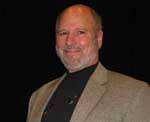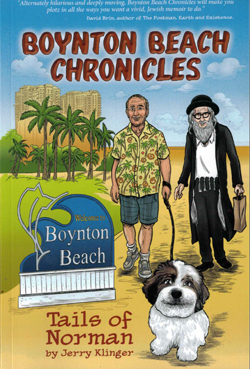Editor’s Note: This is the second installment in a story republished from the fictional Boynton Beach Chronicles: Tails of Norman by Jerry Klinger. The first part, in which William Rabinowitz befriends Mendel, may be accessed here.
-Second of three parts–
By Jerry Klinger

 BOYNTON BEACH, Florida — We had a small bundle of papers on the table, a job application seven pages long and a thirteen-page job description certification. Applying for a job as a tollbooth operator for the South Florida Regional Transportation Authority was more complicated than we had at first thought.
BOYNTON BEACH, Florida — We had a small bundle of papers on the table, a job application seven pages long and a thirteen-page job description certification. Applying for a job as a tollbooth operator for the South Florida Regional Transportation Authority was more complicated than we had at first thought.
Being intelligent Yids, we knew there was no point in applying unless we understood if the job was suitable for the applicant and the employer. Attacking the thirteen-page job description first, we began interjecting our own concerns and questions.
South Florida Regional Transportation Authority
Job Title: Tollbooth Operator
PRIMARY FUNCTIONS:
To collect and record tolls in accordance with tariffs based on vehicle type, weight and number of axles.
- Job knowledge
Know several work tasks and how to do arithmetic to collect and balance tolls and reconcile shift collections.
(We guess that means being able to read the cash register change display and chew gum at the same time.)
- Mental demands
Judgment to select a known action in completing specific tasks to determine and collect appropriate tolls on the Florida turnpike, calculate exchange, apply to fare and reconcile discrepancies between receipts and deposits.
(We guess that means being able to read the cash register change display and give directions for where the on-ramp is in front of drivers.)
- Interpersonal communication skills
Tact required to exchange information related to tollbooth duties and toll station and to answer general inquiries regarding highway conditions with traveling public and emergency services.
(We guess that means being able to read the cash register change display, call the office if there is a problem, and let people know if it is raining – so far so good.)
- Physical coordination and dexterity
Some coordination and dexterity required to operate cash register to collect tolls.
(We guess that means being able to reach into the cash register after reading the cash register change display and make the correct change.)
- Responsibility for work assignments
Guided by set routines, makes minor changes in known job tasks to collect highway tolls, operate cash register, issue change and receipts, and reconcile receipts.
(We guess that means being able to reach into the cash register and make change if the power goes out.)
- Responsibility for financial resources
Some financial responsibility to determine and collect appropriate tolls and balance amount.
(We guess that means being able to read the cash register change display.)
- Responsibility for physical assets/information
Minimal responsibility to operate stable equipment such as credit card machine, telephone, cash register and adding machines.
(We guess that means being able to operate the automatic cash register and change display.)
- Responsibility for interpersonal time management skills
(We guess that means: if you have a weak bladder, do not apply for the job)
- Responsibility for communication, public and emergency service coordination
(We guess that means calling an ambulance when the driver paying the toll has a heart attack; letting the road crews know if the bridge has fallen in because you were told before anyone else that a major crash has occurred and someone wants their toll back because the road is blocked and they can’t get through; being responsible to direct traffic at the tollbooth if the power goes out and drivers cannot figure out if they go forward or backward; being responsible to tell people if there is a hurricane coming, about to come, or is actually here, and taking responsibility for their being on the turnpike during the hurricane. In the event a tourist is lost, confused, or simply nasty, telling them which way they can go and passing out job applications for people looking to be tollbooth operators.)
The application was not too bad, even if it was seven pages long. The usual requirements, name, address, phone number, have you ever been arrested, are you an undocumented alien (but who’s checking?), are you currently employed, have you ever been employed, do you speak any other languages?
For Mendel, it was simple. He spoke English, Hebrew, Polish, and Yiddish. Being as that 32.8% of the people going through a tollbooth only spoke Spanish and another 2.6% only Haitian French, we had to spin it differently. Mendel was conversant capable with 64.6% of toll plaza customers. We estimated that he was actually conversant with another 1.3% who might speak Hebrew or Yiddish. Those who spoke only Yiddish, probably should not be driving because of age. But in Florida, the American Association of Retired People permits even those restricted to nursing homes to keep their drivers licenses.
Did he ever use drugs, was he a veteran, and did he understand he might have to supply a urine sample were asked right at the top of the application, but not in those words. Mendel and I felt pretty good about the job possibility. “There was only one more hurdle,” I said. “Mendel, a guarantee would be nice.”
He smiled back and grinned, “If you want a guarantee, buy a toaster. Luck is when opportunity knocks, and you answer. God has opened the door. It is for us to go through it or not. What is the one more hurdle William, the job interview?”
“No,’ I said, “it would have been nice if they had included the address where to send the application.” We looked it up. A postage stamp later, the application was in the mail.
We both knew, if he got the job, there would be challenges. What to do with Yom Tov, Shabbos and women, for example?
A week later, the letter with the bright green return address of the South Florida Regional Transportation Authority arrived. Mendel and I opened it together. At the top of the letter, in bold text, was written… “We are an equal opportunity employer and a drug/smoke free/gun free workplace. We consider applicants for all positions, without regard to race, color, creed, religion, sex, age, national origin, marital choice, disability, or any other legally-protected status.”
Good thing we read it slowly. It reassured us to know that they do not discriminate for any reason; that ruled out anti-Semitism. We thought about Mendel’s prospects and our spirits picked up. All we were applying for was a job as a tollbooth operator. It is comforting to know that a job applicant can be a blind, female Satanist, with fourteen wives, mentally disabled, illegal, struggling with severe emotional issues and not be required to read, write, or speak English. We were glad for other possible applicants who are covered under “other legally protected statuses,” such as being a snail darter, spotted owl, or caribou mating underneath the environmentally dangerous Alaska pipeline because it was warmer there. We knew he had a reasonable chance of employment.
Mendel’s letter requested he report to the Turnpike director of personal management, Ms. Chantelle Jackson, at the regional administrative office at the Atlantic Road Toll Plaza, Friday at 11:00 a.m.
Normally, Friday’s are a bit of a problem. Mendel likes to go to the mikvah at the Chabad center on El Clair to bathe. He says that cleansing the body is an important preparation. It helps him orient his spirit for the holiness of the Sabbath peace and rest. I don’t go to the mikvah. Mendel’s spirituality is so sincere, so real, so truthful, I feel guilty. I told Mendel how I felt. I just could not be as good and religious and spiritual as he.
Mendel shared a famous Chasidic story with me.
“There once was, maybe there still is, a huge bird that lived on a desert isle and his name is the ‘Fah.’ The Fah was afflicted with painful and unseemly sores all over his legs. Sometimes he would look at his legs and sink into utter desperation because of the terrible sores, and he would contemplate hurling himself in the sea. Finally, he takes off into flight and prepares himself for his last moments before hurtling into the depths.
As his last moment of life approaches, he, all of a sudden, catches a glimpse of his outstretched wings, skillfully maneuvering the air currents, their multicolored feathers glistening and glimmering in the sunlight. He feels unexpectedly revived, his desire for life surges through him and the Fah changes course, now soaring higher and higher into the skies with renewed enthusiasm and joy.”
“So, it is with us,” Mendel quoted R’ Chaim of Sanz as saying. “When we look at ourselves and our deeds, we can easily come to despair. How small and insignificant we are. How much potential have we wasted, how many precious hours and minutes have we let slip through our fingers with nothing accomplished? But when we tell stories of our tzadikim and reflect on their lives and deeds, we become refreshed, we are reminded just what a Jew can become. We once again have hope!”
“William,” he said. “I am no better than you. I know only what can be if you give yourself the freedom to see, to trust, to believe.”
“Maybe, someday,” I said. “Maybe, someday.”
(End Part Two)
*
Jerry Klinger is the founding president of the Jewish American Society for Historic Preservation. In his free time, he enjoys writing fiction.
Pingback: Fiction: Mendel the Chasid's job interview - San Diego Jewish World
Jerry,
Would you be able to talk to my grandson in
San Diego California about the Chasid wisdom you have written about. If so. I can trade you for your efforts with a massage chair I no longer need.
Fellow writer,
Ira Spector